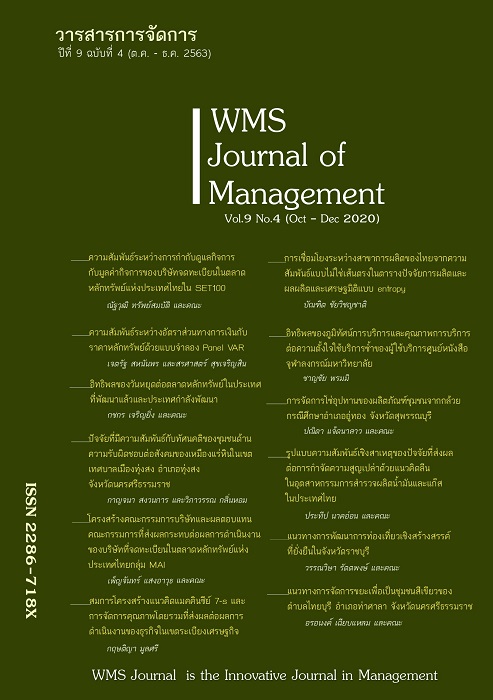Pre and Post-Holiday Effects: Evidence from Developed Countries and Developing Countries Stock Markets
Main Article Content
Abstract
This research aims to study the market anomalies of pre-holiday and post-holiday, which affect the returns of stock markets in developed countries and developing countries. The data used for the analysis is collected from 10 developed countries and 10 developing countries for 10 years between 2007 and 2017. This research calculated the average abnormal returns (AAR) and the cumulative average abnormal returns (CAAR) to testing the holiday effect with efficient market hypothesis. The results revealed that all sample countries related to CAAR for 2 days before holidays and after holiday for 4 days significantly. Moreover, in the group of developed countries found the significant result of pre-hoilday for 2 days (t-2) but it did not found the significant result of post-holiday. Whereas the developing countries found CAAR between pre-holiday and post-holiday (t-1 to t+4), which means that the stock markets of the sample countries have low efficiency, and investors can arbitrage in the stock markets.
Article Details
References
Chancharat, S., Maporn, S., Phuensane, P., & Chancharat, N. (2018). Volatility of holiday effects in Thai stock market. Kasetsart Journal of Social Sciences, in press, 1-6.
Chia, R. C. J., Lim, S. Y., Ong, P. K., & Teh, S. F. (2015). Pre and post chinese new year holiday effects: evidence from Hong Kong stock market. The Singapore Economic Review, 60(4), 1-14.
Fama, E. (1970). Efficient Capital Markets: A Review of Theory and Empirical Work. Journal of Finance, 25(2), 383-471.
Jenwittayaroje, N. (2017). chūang khō̜ng rưdūkān thī hai phontō̜pthǣn thī sūng kwā chūang rưdūkān ʻư̄n nai Talāt Laksap hǣng Prathēt Thai [The range of seasons that have higher returns than other seasons in the stock exchange of Thailand]. Nida Business journal, 20, 117-131.
Kim, C. W., & Park, J. (1994). Holiday effects and stock returns: further evidence. The Journal of Financial and Quantitative Analysis, 29(1), 145-157.
Manitkajornkit, E. (2017). Holiday effect in stock exchange of Thailand from January 1992 - August 2013. Governance Journal, 6(2), 78-96.
Marrett, G. J., & Worthington, A. C. (2007b). An empirical note on the holiday effect in the Australian stock market, 1996–2006 Applied Economics Letters, 16(17), 1769-1772..
Mehdian, S., & Perry, M. J. (2002). Anomalies in US equity markets: a re-examination of the January effect. Applied Financial Economics, 12(2), 141-145.
Meneu, V., & Pardo, A. (2004). Pre-holiday effect, large trades and small investor behaviour. Journal of Empirical Finance, 11, 231-246.
Lei, L., & Sifeng, L. (2008). Are there holiday effect in China’s stock market?. Journal of Financial Research, 9(2).
Sasikirono, N., & Meidiawati, H. (2017). Holiday Effect in the Indonesian Stock Market. Advances in Intelligent Systems Research, 131, 109-112.
Tangjitprom, N. (2010). Preholiday Returns and Volatility in Thai stock market. Asian Journal of Finance & Accounting, 2(2), 41-54.
Teng, C.-C., & Liu, V. W. (2013). The pre-holiday effect and positive emotion in the Taiwan Stock Market. Investment Analysts Journal, 42(77), 35 - 43.
Visittavanich, C. (2016). kānsưksā khwāmphit pakati khō̜ng talāt laksap : ʻitthiphon khō̜ng wan yut læ dư̄an khō̜ng talāt [Stock Market Anomalies: Holiday Effect and Month Effect in Stock Exchange of Thailand]. (Master Degree’s Thesis, Bangkok University, Thailand).
Wong, K. A., Hui, T. H., & Chan, C. Y. (1992). Day-of-the-week effects: evidence from developing stock markets. Applied Financial Economics, 2(1), 49-56.


